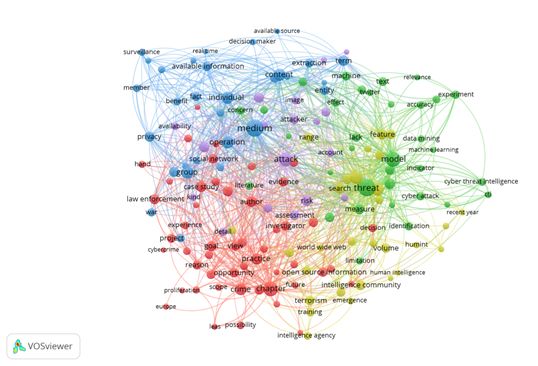Researchers and collaborators at OSI Lab come from a interdisciplinary backgrounds, such as public administration, information science, computer science, and cybersecurity. In addition, we partner with other laboratories at CEHC, including the Cyber Range and Center for Advanced Red Teaming. OSI Lab draws students from a wide variety of undergraduate and graduate programs in information science, emergency management, and homeland security.
Leadership
Stephen Coulthart
Director, Open Source Intelligence Lab
Associate Professor, College of Emergency Preparedness, Homeland Security, Cybersecurity
Dr. Coulthart’s research focuses on intelligence analysis and the impact of emerging technologies on security. His research has been published in Intelligence and National Security, International Affairs, and the Journal of Conflict Resolution, Public Administration Review, among others. He is the lead editor of Researching National Security Intelligence: Multidisciplinary Approaches (Georgetown University Press). Dr. Coulthart has contributed commentary to outlets such as “Defense One” and the Washington Post’s “Monkey Cage” and “Grade Point.” In 2018, Dr. Coulthart was selected by the Office of the Director of National Intelligence to serve with other experts to analyze emerging national security technologies. He is also a fellow with the Truman National Security Project and has conducted analysis as well as provided training support to numerous governmental and non-governmental entities in the United States and Europe.
Current Interns
Ana Jeranashvili
Ana is a senior in the College of Emergency Preparedness, Homeland Security, and Cybersecurity with a Homeland Security concentration. Additionally, Ana is studying in the Rockefeller College to obtain a second major in Criminal Justice. She is an international student at UAlbany hailing from the country Georgia. She has been working with the OSI Lab since August 2023 and is currently working with Jake and Ryan on a research project to present at the International Association for Intelligence Education (IAFIE) conference. Ana is also a co-founder and the Public Relations Chair of the developing UAlbany OSINT Club.
Ryan Boyle
Ryan is a senior in the College of Emergency Preparedness, Homeland Security, and Cybersecurity with a Homeland Security concentration and Criminal Justice minor. He has been working with the OSI Lab since August 2023 and is currently working with Jake and Ana on a research project to present at the International Association for Intelligence Education (IAFIE) conference. His previous internship experience includes working with the New York State Intelligence Center, United States Marshals Service, and New York State Division of Homeland Security and Emergency Services. Ryan is also a co-founder and the President of the developing UAlbany OSINT Club.
Jake Wunder
Jake is a senior in the College of Emergency Preparedness, Homeland Security, and Cybersecurity with a Homeland Security concentration and Criminal Justice minor. Jake is also in the College of Emergency Management and Homeland Security 4+1 graduate program with a concentration in Intelligence Analysis. He has been working with the OSI Lab since August 2023 and is currently working with Ryan and Ana on a research project to present at the International Association for Intelligence Education (IAFIE) conference. His previous internship experience includes working with the New York State Intelligence Center and the New York State Division of Homeland Security and Emergency Services. Jake is also a co-founder and the Treasurer of the developing UAlbany OSINT Club.
Collaborators
Dr. Brian Nussbaum
Assistant professor in the College of Emergency Preparedness, Homeland Security and Cybersecurity (CEHC) at the University at Albany.
He also serves as an affiliate scholar at the Center for Internet and Society (CIS) at Stanford Law School. His research has been published in the International Journal of Intelligence and Counterintelligence, the Journal of Cyber Policy, Computer Law & Security Review, the Journal of Financial Crime, Public Integrity, and Business Horizons. He formerly served as senior intelligence analyst with the New York State Office of Counter Terrorism (OCT); and has worked broadly as an instructor of intelligence analysis for both university students and practitioners.
Center for Advanced Red Teaming
As the first academic center devoted to advancing the art and science of red teaming, the Center for Advanced Red Teaming (CART) seeks to address a conspicuous need, identified by practitioners, for both research and education in this growing area of security studies. Launched in November 2019, the Center conducts multiple types of red teaming as part of its research and education efforts. Learn move by visiting the Center for Advanced Red Teaming (CART) website.
Advisory Board
- Richard Denholm
JD, Director at A1C Partners LLC, FBI Supervisory Special Agent and FBIHQ Unit Chief (retired) - Carmen Medina
Senior Analytic Manager, Central Intelligence Agency - Arno H.P. Reuser
Founder and director Reuser's Information Services, Founder and manager (ret.) Open Source Intelligence Branch NLMOD (1990-2013) - Efren Torres
Founder of the Global Hazards & Open-Source Team (GHOST), private sector OSINT analyst - Tyler Wrightson
Founder, Leet Cybersecurity







